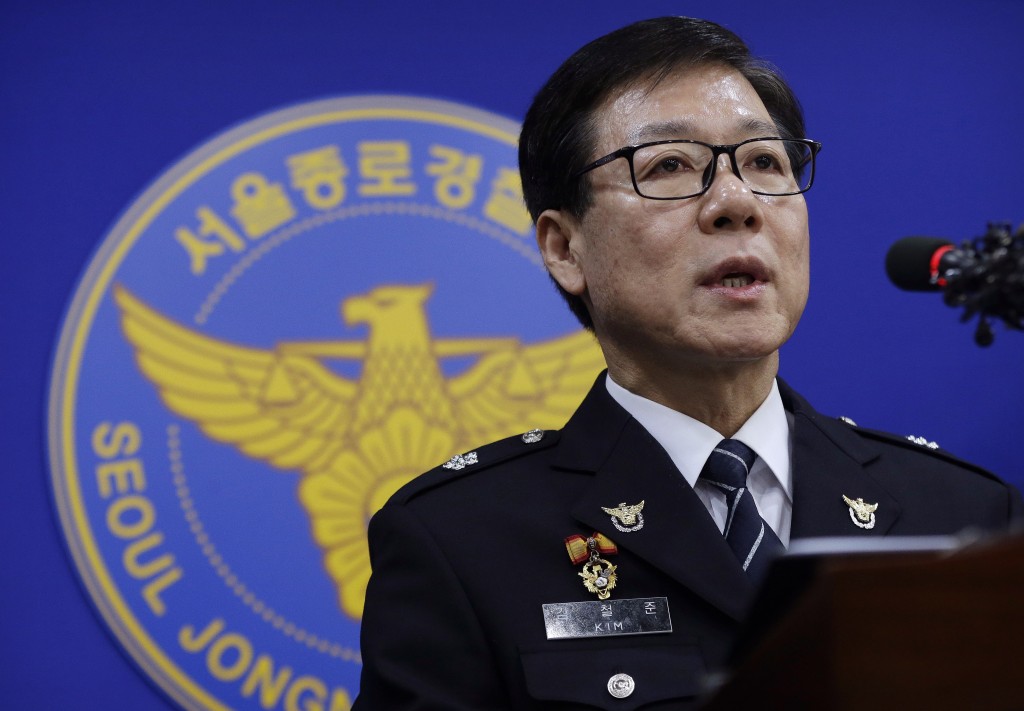- California Assembly OKs highest minimum wage in nation
- S. Korea unveils first graphic cigarette warnings
- US joins with South Korea, Japan in bid to deter North Korea
- LPGA golfer Chun In-gee finally back in action
- S. Korea won’t be top seed in final World Cup qualification round
- US men’s soccer misses 2nd straight Olympics
- US back on track in qualifying with 4-0 win over Guatemala
- High-intensity workout injuries spawn cottage industry
- CDC expands range of Zika mosquitoes into parts of Northeast
- Who knew? ‘The Walking Dead’ is helping families connect
Lippert’s attacker contacted convicted N. Korean spy beforehand: police

Kim Cheol-jun, lead investigator from the National Police Agency, gives a briefing on March 13, 2015, on the probe into Kim Ki-jong, the man who is suspected of attacking the top U.S. envoy last week. (Ahn Young-joon/AP Photo)
SEOUL, March 13 (Yonhap) — The suspected attacker of the top U.S. envoy in Seoul contacted a South Korean man previously convicted of spying for North Korea before carrying out the attack, police said Friday.
Kim Ki-jong was arrested last week on charges of slashing U.S. Ambassador to South Korea Mark Lippert on his face and wrist with a knife during a breakfast function in downtown Seoul. The attack left Lippert with wounds that required 80 stitches.
The 55-year-old faces charges of attempted murder, violence against a foreign envoy and business obstruction. Police said they are planning to ask the prosecutors to take over the case later in the day.
Kim has said he was acting alone. But a special task force investigating the case said the 55-year-old contacted more than 30 people — including a former spy for North Korea and a key member of a pro-North Korea organization here — in the run-up to the incident.
Kim Cheol-jun, the lead investigator from the National Police Agency, said authorities are delving further into Kim’s phone and bank transaction records to find out whether any of them had been involved.
The investigator also said Kim Ki-jong told officers he attacked the envoy to alert the U.S. to the fact that the ongoing South Korea-U.S. joint military drills hinder inter-Korean reunification.
South Korea and the U.S. have jointly carried out the annual exercises to prepare for a possible invasion from the North. The two Koreas remain divided as no peace treaty has been signed to formally end the 1950-53 Korean War.
Authorities also said some of what Kim told them shared striking similarities with North Korea’s saber-rattling; Kim reportedly told them South Korea was a “semi-colony” of the U.S. while North Korea was an independent, autonomous country.
Police said they also believe the attack was premeditated. Kim’s Internet browsing history shows that he had looked up Lippert’s blog, his height and South Korea’s criminal law a day before the incident, according to authorities.
He also appeared to have had an intent to kill, police said. He reportedly said he brought a knife because his previous attempt to harm a Japanese ambassador to Seoul years ago failed. He also slashed Lippert at least twice, leaving deep gashes on his face and arm that required more than 80 stitches.
Kim, however, has said he hadn’t planned on bringing the knife until the last minute and that he didn’t mean to kill the envoy.
Lippert reportedly told authorities he wanted Kim to be punished. He was completely taken unaware by the assailant, according to the testimony he gave to the police a day earlier. The envoy also reportedly said he thought he would have been killed if he didn’t hurry towards the exit.
Police are also continuing their investigation into the possibility that Kim violated a controversial security law, which bans South Koreans from openly praising North Korea. More than 20 books that are suspected of being in violation of the National Security Law were found in his home, they said.
Anti-U.S. activists here have argued the U.S. has hampered progress for Korean unification. But no one had attacked a U.S. envoy before Kim. He was also the first South Korean to try to harm a foreign envoy when he threw pieces of rock at a Japanese ambassador in 2010.















